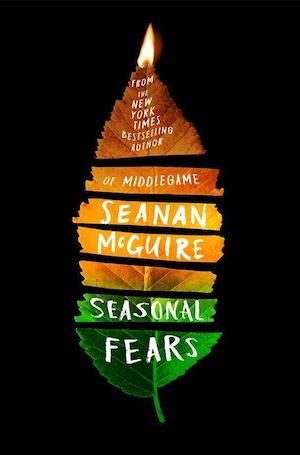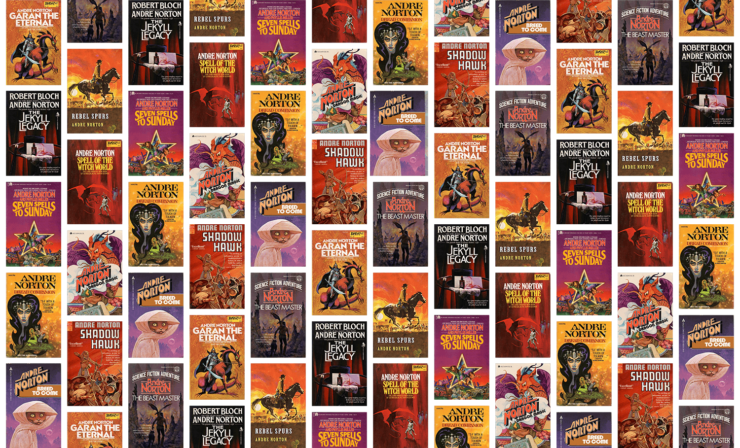It’s been a long voyage since the first post in this series. Five years! It’s a tribute to the range and extent of Andre Norton’s work that I’m still here and that you all are still here with me. I haven’t loved every book of hers that I’ve read or reread, but I have loved the journey, and I have even more respect for her now than I did when I began.
I’ve often repeated the things she doesn’t do. She doesn’t do complex or nuanced characters, or character development beyond the bare basics. Her plots are very much in charge, to the point that characters will act and move without volition, simply because the plot requires them to.
She is not a prose stylist. Her writing is serviceable. It’s there to do the job of moving characters through her clearly delineated and firmly constructed plots.
Once in a while she may run out of plot halfway through and start the same sequence of events all over again, presumably to fill up the word count. Or conversely and much more often, she will reach the end of her word count and have to wrap everything up in a couple of pages or even a couple of paragraphs.
She has quirks and biases, as do we all. She has an ongoing hate-affair with toads and toadlike beings, which spills over into a general tendency to equate physical ugliness with evil. In her worlds as in her characters, there’s not much nuance, and little ambiguity. What you see, for the most part, is what you get.
Even when something looks fair and is foul, there are clear signals that This Is Bad. The garden of evil overstates its case; its beauties are excessive, its colors too bright, its scents cloying. The wicked queen or the cruel stepmother is too focused on her looks. She’s cruel and shallow and vain, and she has minions who reflect her darker side. You know as soon as you meet her (or him) that this is an antagonist.
And yet, what Norton does do, she does as well as anyone out there. She is a master of pacing. Her plots move, and they pull the reader right along with them. She knows how to keep the pages turning.
She builds worlds with a clear and present sense of joy in her own imagination. She loves to fill them with the weird and the wonderful. Whether magical or science-fiction-alien, her worlds are full of flora and fauna both strange and familiar.
She stretches her own talents and her readers’ imaginations by trying to show truly alien minds and thought processes—not all of which inhabit other planets. Humans aren’t the only intelligences in her universes. Some of those are beyond human comprehension. Some are benevolent, some malevolent, and many are simply indifferent.
Buy the Book


Seasonal Fears
Best of all, at least for me, she loves the idea of animal companions. Cats in particular, or beings like cats. Norton was a cat person, and that shows in novel after novel and story after story. Over and over again, her characters form bonds with creatures in animal form, either straightforward animal intelligences like the ones in the Beast Master series, or beings of at least human intelligence, such as the mysterious alien, Eet.
The point she makes, continuously and consistently, is that the universe is vast and varied, and humans are not at the center of it. Nor is one variety of human the measure of all others. She strove to portray diverse characters and diverse cultures—not always successfully or with sufficient examination of her own White, middle American assumptions. But she tried. She did her best to do justice to Black and Native American characters in particular, which is still an American-centric view, but it’s not purely White-centric.
It really is amazing how prolific Norton was, and how many genres she managed to write and publish in. She’s best known for her science fiction, and for the grand work of science fantasy that is the Witch World. She wrote mysteries, thrillers, boys’ adventure stories, historicals, Gothic romances. She tried her hand at the medieval beast fable. She wrote for adults, for teens, for younger readers.
She was tireless. What’s even more amazing is how little sense I got that she grew bored with the requirements of the different genres. She repeats plots and character types and themes over and over, but there’s always something fresh there, something a little different, some reason to keep reading, even when I know how it has to end. The familiar tropes bring a sense of comfort. I know what I’m getting here. I can strap in and let her take me on this latest voyage, whether it’s to a world I’ve known and loved before, or one I’ve just now encountered.
It’s no wonder she was named a Grand Master by the Science Fiction Writers of America as they were known at the time, and that she was awarded the Gandalf Award as a grand master of fantasy, and that she received the Life Achievement Award from the World Fantasy Convention. She wrote science fiction, she wrote fantasy, she crossed the genres early and often, and she did it with confidence. She knew exactly who she was as a writer, and what she wanted to do.
Norton brought so many readers into both science fiction and fantasy. She had a gift for telling a story, and a gift for building strange new worlds, and a gift for opening those worlds to her readers. She came back again and again to a particular kind of character: young, alone, isolated from the world they live in; orphaned or disconnected in some way from their family; thrust into situations they were never trained or prepared for.
They find their way through. They not only survive, they triumph. And in the process, they find family. They’re no longer alone. They’re a part of something bigger than themselves, doing things well worth doing, whether saving the world or making a home for themselves and the hearts’ companions they’ve found along the way. Or, usually, both.
This is a powerful theme, and she is masterful in her development of it. She assures her readers that however terrible her characters’ situations are, they will come through. They will find a place that’s theirs, and people (in whatever shape or form they may be) who feel the same way and want the same things.
She gives her readers what they need, time after time. She keeps her promises. And above and beyond all that, she shares. She welcomes other writers into her worlds. She turns them loose and lets them play, sometimes brilliantly, sometimes less so, but always with grace and generosity.
I knew when I started this series that Andre was an amazing person. Having read almost every word she wrote, and taken time to think about each of her numerous novels and many of her collaborations, I have nothing but admiration for the body of work she left, and the influence it’s had on our genre. She showed so many of us what was possible; what our imaginations could do, and where they could take us.
We’re in a different world now than the one she knew and wrote in. But she saw it coming, and she did her best to lay the foundations for it. I like to think she would have loved to the depth and breadth of the genre as it now, the level of talent we’re seeing, and best of all, from the point of view she showed us, the variety and diversity of people who are writing and publishing.
It’s not a perfect world, or even close, but neither were the worlds Norton created. She knew that humans are a difficult species, much prone to sabotaging itself. And yet she held on to hope. That’s a good example to follow.
Judith Tarr has written historicals and historical fantasies and epic fantasies and space operas, many of which have been published as ebooks. She has won the Crawford Award, and been a finalist for the World Fantasy Award and the Locus Award. She lives in Arizona with an assortment of cats, a blue-eyed dog, and a herd of Lipizzan horses.










